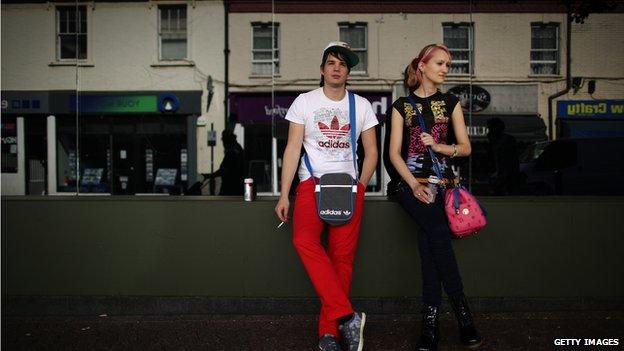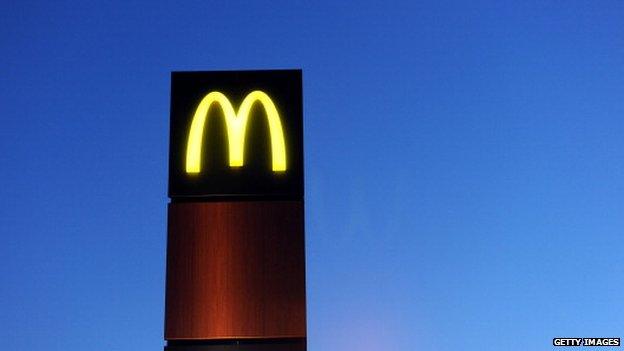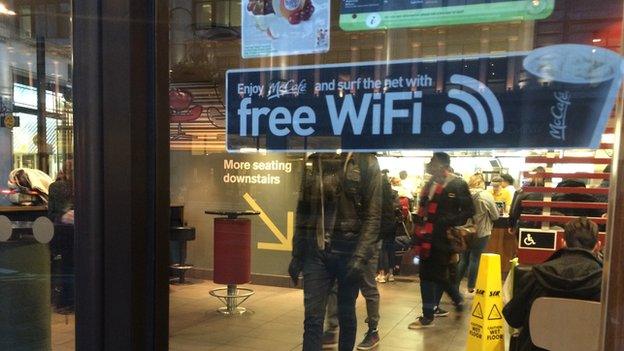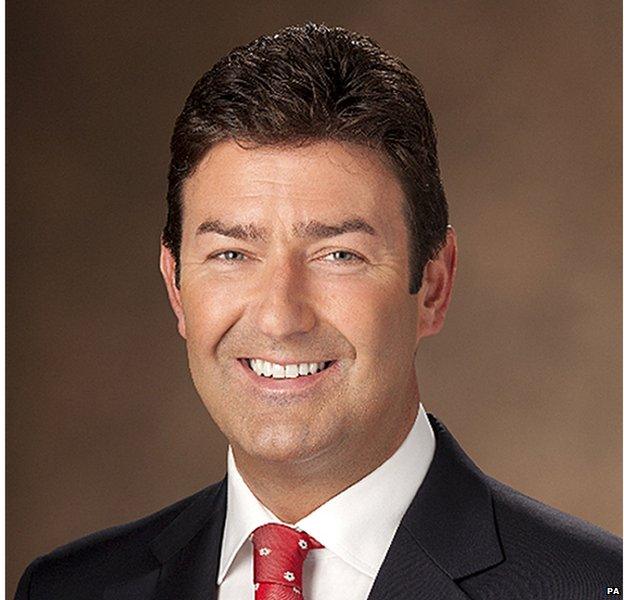Do the British love McDonald's most?
- Published
.jpg)
The golden arches, Big Macs, Happy Meals - they couldn't be more American, right?
But it's a British man, Steve Easterbrook, who is taking charge of McDonald's.
And while the chain's profits have fallen globally, it's in good health in the UK.
Newsbeat's been speaking to some experts about why "Maccy Ds" is still going strong in Great Britain.
"It's a great coup for a Brit to be taking over one of the biggest eating out brands on the planet," says Peter Martin from Peach Consulting.

Steve became CEO of McDonald's in the UK in 2006, and is credited with boosting sales at a time when "the company was going backwards", according to Peter.
Nine years on, the UK is one of the biggest markets for the company in Europe, alongside Germany and France.
A survey last year by the research company Mintel suggested more than half of the population visited one of the 1,200 restaurants in the previous three months.
The golden arches have been shining a little less brightly in the rest of the world though.
While the UK produced positive results in 2014, sales in Europe declined.

Last year global sales fell by 7% to $6.5bn (£4.2bn) and profits plummeted by 15% to $4.7bn (£3.1bn).
The company has had to face meat scandals in Asia, protests over wages, legal cases over racism and increasing competition.
So why is McDonald's flourishing in the UK?
Coffee and wi-fi
Jackie Grech from the British Hospitality Association told Newsbeat the company has simply "got it right" here.
"While burgers are still a core part of the offer, the menu choices are wider and healthier with items like porridge, salads and wraps.
"They keep the cost low, give readily available nutrition information and free wi-fi - that's very important."

Peter Backman from Horizons says: "They've refurbished their stores, they trained their people and brought them onboard and got them motivated."
And Paul Flatters, from the Trajectory Partnership, says: "They've achieved something in the UK they haven't elsewhere - a successful repositioning to cafe-style."
"They've managed to change perceptions of McDonald's to some extent - you can get decent coffee or a salad. They've been more innovative in the UK."
He points out those changes could be harder to make in other countries where the company is larger.
Less booze
Paul says what he calls the "booming" eating out market in the UK helps too.
"Young people are drinking significantly less alcohol than previous generations. That free time that was being spent in pubs is now going to other outlets and McDonald's benefits from this.
"Relative to other countries in Europe youth unemployment is far lower.
"It would be quite hard not to make money out of eating out in the UK."
In contrast, the eating out market in the US is described as "at best flat" by Peter Backman.
Burger lovers
Or could it be that McDonald's has become more a part of life in the UK than elsewhere?
.jpg)
Peter Backman thinks not.
"It is a strong part of our culture - but that's the case in a number of other countries as well."
But Paul Flatters says for most people in the UK "McDonald's would be the original burger experience.
"If you're in your 40s it would be the first burger place you went to. If you're in your 20s it's the main burger place you grew up with.
"The burger culture is obviously different in the States.
"Their problem in the US is that McDonald's is a mid-range brand and they don't have a distinctive niche.
"In the States for an upmarket experience you go to Shake Shack or similar, or if you're at the other end you go to the chains that are cheaper than McDonald's."
Karla Rendle, from Euromonitor International, agrees competition is intense.
"The decline in sales is due to increasing competition from other types of specialised fast food outlets focussing on being the best at one thing, such as Japanese or quality sandwiches.
"There's a growing appetite for different cuisines such as Mexican or Japanese which are perceived as healthier and more natural.
"The emergence of upmarket burger outlets with a strong focus on quality meat such as Byron Burger, Honest Burgers or Five Guys has also had a negative impact."
Bounce back?

It's up to him now
So will the company make a comeback?
Paul says that looks likely: "There was a sticky period before and you could argue that the UK is at the leading edge of their development and no doubt warning bells will be ringing at McDonald's around the world.
"I suspect McDonalds will be scratching their heads and moving quickly to change things.
"Maybe the UK was five years ahead in terms of the downturn and the recovery."
Follow @BBCNewsbeat, external on Twitter, BBCNewsbeat, external on Instagram and Radio1Newsbeat, external on YouTube